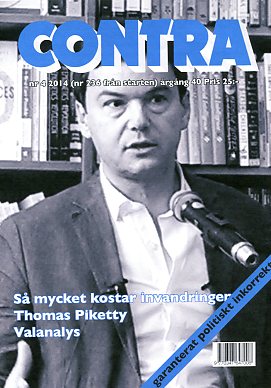
A Warning for Thomas Piketty
by Fredrik Runebert
The French economist Thomas Piketty is popular in media after having published Le capital au XXI siècle, or Capital in the XXIst century. Leftists are especially fond of Piketty’s proposals for equalization of incomes and wealth, as well as his predictions of natural imbalances in capitalism. Who said it 150 years ago and was proved wrong? According to Piketty the distrbution of wealth and income today are as unequal as they were in the end of the 19th century. And his forecast is that it will turn even worse. His thesis is that private wealth grows more rapidly than production. Much of Piketty’s studies are based on English, French and American data. Sweden is only mentioned a few times in the book. If he widens his perspective he would find that his conclusions are wrong.
The parliamentary election in Sweden,
by C G Holm
This article contains an analysis of the social structure of sympathisers of different parties. If the voters had been only city dwellers, only countryside dwellers , only employees in the private sector of the economy, only self-employed, only men, only people over 65 the former government had succeeded in staying in power. But this was not the turnout. Day care center workers vote for the Leftist (former Communist) Party or the small extremist Feminist Party. The Feminists got 13.4 per cent of the votes among students – a true sign of the crisis in Swedish education, when one in eight votes for irresponsible extremists. The third extremist party, the Greens, was overrepresented among students, union members with a degree and women employed in the public sector. It could also be noted that the Sweden Democrats (often called populists or even racists) got twice as many votes as the Leftist (former Communist) Party among blue-collar workers. But still, the biggest party among the workers was the Social Democrats and the second biggest the Moderates (Conservatives).
More Russian ”fake countries”,
by C G Holm
”The People’s Republic of Donetsk” and the ”People’s Republic of Luhansk” are the two latest additions to the long list of fake countries controlled by Russia. The article deals with Chechnya, Transnistria, Abchasia, South Ossetia and Nagorno-Karabach.
How to tell people about Contra
Jonas Bohman is the mailman who loves to do an extra tour after work distributing promotional copies of Contra magazine.
The cost of immigration,
by Géza Molnár
In 2013 121,000 persons immigrated to Sweden, more than the number of babies born (114,000). For some reason the cost of immigration has been taboo, a question that should not be discussed. The reason that immigration is a cost and not an income is due to the structure of immigration (unskilled people from the Third World dominate). Contra concludes that the cost is approximately 20,000 kronor (3,000 US $) for every working Swede.
Russian elite troops are back,
by Géza Molnár
During the last decade of the 20th century and the first decade of the 21st Russian military power collapsed. Since some years there is a rebuilding of military strength and this is noticed in conflicts in places like Georgia and Ukraine. Russian elite forces (Spetsnaz) were never as low in the sewer as the ordinary troops, but they also deteriorated, but not so any more.
Sweet Home Alabama,
by Filip Björner
This year it was forty years ago the song Sweet Home Alabama was first played. It is one of the most well-known songs in Southern Rock. And close to the Jubilee the State of California (not part of the Confederation) has banned hoisting the Confederate flag at state institutions as well as selling it at State parks and similar.
Wrong information on own income makes people more leftist and more in favour of redistribution
The Swedes know to little about their own income in order to make rational decisions! It might be odd, but Swedes have a much inferior view on their own income compared to the national average, than people in most countries. They think that they are relatively worse off, than they really are. If they in advance are told about their actual relative status it turns out that they rapidly turn against redistribution and in favour of more right-wing political parties. With the only variable changed being the information on the income, not the income itself.
Angola’s president dos Santos is worth 20 billion dollars – and his people is starving,
by Tommy Hansson
According to Forbes magazine, Angola’s president José Eduardo dos Santos, born in 1942, is undisputed number one of the recently published list of the wealthiest leaders in Africa. The entire list is found here: http://www.richestlifestyle.com/richest-african-presidents

